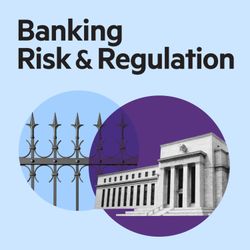Banking Risk & Regulation Podcast
All Episodes

Drama at the FCA: can it survive?
09:15|Editor Farah Khalique discusses scrutiny of the UK's financial services regulator and calls for reform with The Banker's deputy editor, Liz Lumley.
ESMA’s Verena Ross discusses the authority’s work on ESG, digitisation, data, benchmarks and cooperation with third countries
34:53|The European Securities and Markets Authority has a broad remit bringing it into contact with many areas of financial markets, at the wholesale and retail level. In this episode of GRR’s regulatory podcast series, Verena Ross, chair of ESMA provides insights into the authority’s work around: ESG and curbing greenwashingAnalysing and collecting markets data relating to regulations such as MiFID Challenges around implementing and future proofing DORA and MiCAThe Benchmarks Regulation and its impact on third country benchmark providersFinancial stability and the role of non-financial bank intermediation ESMA’s work with third country regulators and global standard setters The biggest challenges facing securities regulators over the next five years
The impact a digital euro would have on banks and the financial system - a discussion with the ECB
37:55|Central bank digital currencies (CBDCs) could usher in a revolution in the financial system creating openings for exciting new innovations. However, depending on their design, CBDCs could be disruptive, particularly for deposit taking banks. The European Central Bank is currently studying designs for a potential digital euro. This has ignited a lively debate within policy making and banking circles. In this podcast, Ulrich Bindseil, director general of market infrastructure and payments at the ECB, gives his take on some of the big issues surrounding a digital euro. Topics covered include: Status of the ECB’s workFinancial stability considerationsGeopolitical role of the digital EuroDesign considerations Privacy Legal tender questions Alternatives to a digital euro Programmability
12. Are stablecoins a threat to financial stability?
44:13||Ep. 12Stablecoins have seen explosive growth in the last year with the Bank for International Settlements estimating that as of late 2021, there were $120bn of them in circulation.This has caught the attention of regulators who are pondering whether these instruments will revolutionize finance in a beneficial way for society or could become a major financial systemic threat.To address those issues is Dante Disparte, chief strategy officer and head of global policy at Circle - an issuer of the USDC dollar stablecoin.
12. What impact will central bank digital currencies have on the financial system?
44:19||Season 1, Ep. 12According to the Bank for International Settlements around 80 central banks are exploring or developing central bank digital currencies (CBDCs). Some experts consider CBDCs to be among one of the most significant developments in the history of money. Depending on their design they could have a profound impact on the financial system and society. This podcast explores a range of issues related to CBDCs, such as their design, should they be programmable, disintermediation of financial institutions, potential threats from stablecoins through to concerns around privacy. Addressing those questions are John Velissarios Blockchain and Multiparty Systems - Digital Assets, Custody & CBDC Lead at Accenture and Kimmo Soramäki, founder & CEO at FNA who has worked for a number of central banks.
11. How will crypto regulation shape the future of traditional financial services?
53:30||Ep. 11The rise of blockchain and crypto assets are going to profoundly influence the future development of financial services and are naturally of great interest to supervisors. How supervisors decide to regulate crypto will in itself play a major role in how traditional financial services adapt to this new phenomenon. This episode looks at the approaches being taken in the EU, UK, US and some other jurisdictions and how it might impact the transition of crypto into mainstream finance. It also looks at how the recent consultation by the Basel Committee on Banking Supervision on the prudential treatment of crypto exposures will influence banks. Exploring these issues is Yves Longchamp, head of research at SEBA Bank, a Swiss bank providing a bridge between traditional and digital assets and Lavan Thasarathakumar, the regulatory affairs director EMEA at Global Digital Finance, an association advocating for digital assets.
10. A conversation with the CEO Of the Dubai Financial Services Authority about ESG, crypto and regulatory reporting
38:00||Ep. 10Environmental, social governance (ESG) factors and the rapid rise of crypto assets and currencies and blockchain have all become major focal points for supervisors. This is necessitating, in some cases, new regulatory frameworks or adapting existing ones. In this episode, Bryan Stirewalt, the CEO of the Dubai Financial Services Authority (DFSA) shares his insights into how the authority is approaching the regulation of crypto and he also delves into how the global adoption of ESG can be encouraged in a more standardised fashion.Other topics covered include the DFSA’s work with international standard setters such as the Basel Committee on Banking Supervision where Mr Stirewalt represents non-Committee members.
9. Could central bank digital currencies revolutionise capital markets? A discussion with the Swiss National Bank
23:45||Ep. 9The potential introduction of central bank digital currencies (CBDCs) could potentially upend bank business models depending on their design and implementation. It’s a topic, which has implications well beyond monetary policy and the nature of money. The rapid rise in the popularity of crypto currencies such as bitcoin, Facebook's plans around creating stablecoins backed by existing national currencies and the growing digitisation of financial services has prompted central banks to seriously investigate the viability of introducing CBDCs.One central bank that has been very active in investigating this area through Project Helvetia, is the Swiss National Bank (SNB) along with its collaborators the Bank for International Settlements and the SIX Exchange. To gain a better understanding of project Helvetia, the possible impact of CBDCs on capital markets, clearing, foreign exchange and governance we approached Martin Schlegel, an alternate member of the board at the Swiss National Bank for his insights.
8. How might ESG impact prudential regulatory frameworks?
27:56||Ep. 8Prudential frameworks are designed to ensure banks can cope with risks and still remain solvent in the face of economic adversity. Environmental, Social and Governance (ESG) factors have risen up the political and regulatory agenda due to issues such as increasingly extreme weather patterns through to growing concerns over social justice. Society increasingly expects banks, as capital allocators, to do their bit in helping to fight climate change and to not support certain unethical businesses. This could eventually result in changes to the Basel framework through to the EU's capital requirements regulation and directive (CRR/CRD).This podcast asks whether regulators should use green supporting and brown penalising factors to influence bank lending policies, how stress tests can ensure banks can cope with ESG related scenarios through to how to cope with the fact that there is not enough ESG data to populate bank risk models. Exploring this topic is Ingalill Asphold, Head of Banking Prudential Regulation, Markets at Finance FInland and Jeroen Van Doorsselaere, Head of Global Product & Platform Management GRC Finance, Risk & Reporting at Wolters Kluwer - Financial Services Solutions
loading...